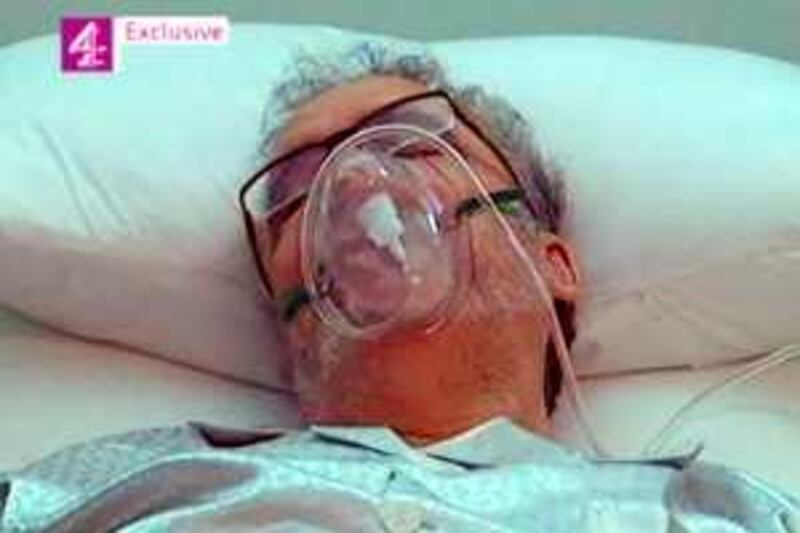LONDON // Ministers' correspondence over the freeing of the Lockerbie bomber was published yesterday in a bid to prove that the United Kingdom had made no deals with Libya over his release. The unprecedented move to publish confidential government letters came after days of mounting media speculation that the freeing of Abdel Basset al Megrahi was linked to a major oil deal between Libya and BP, the London-based energy company.
Although the letters made public yesterday afternoon showed that the UK had left the decision in the hands of ministers in the quasi-independent Scottish executive, it was also apparent that ministers in London had considerable input in the process. Jack Straw, the British justice secretary, raised the issue of al Megrahi's release with Alex Salmond, the Scottish first minister, in November. Mr Straw pointed to the Libyan government's "concerns for health and possible return to Libya" of al Megrahi, 57, but stressed that the ultimate decision rested with the Scottish executive.
Al Megrahi, the only person convicted of the bombing of Pan Am 103, which crashed in Lockerbie in December 1988 killing 270 people on board and on the ground, was freed on August 20 by Kenny MacAskill, the Scottish executive's justice minister, on compassionate grounds. Al Megrahi returned to Tripoli where he was afforded a hero's welcome, something that inflamed passions in the West, particularly in the United States. The US president Barack Obama led a chorus of outspoken objections over the release, which has put an unfamiliar strain on the Anglo-American "special relationship".
Libyan television footage Sunday showed al Megrahi in a hospital, breathing through an oxygen mask. There is no way to independently verify his health and it was not clear how long he has to live. He has terminal prostate cancer. Yesterday's move to publish the correspondence was being seen as a final attempt to end the speculation that a deal had been done with the Libyan president, Muammar Qadafi, linking al Megrahi's release to trade ties.
Particularly damaging had been a correspondence obtained by the Sunday Times that showed that two years ago Mr Straw had specifically agreed that al Megrahi could be included in a prisoner-transfer agreement being drawn up between Britain and Libya at a time negotiations over the BP oil deal were at a crucial stage. In a letter to the Scottish government in December 2007, Mr Straw wrote: "The wider negotiations with the Libyans are reaching a critical stage and, in view of the overwhelming interests for the United Kingdom, I have agreed that in this instance the [prisoner-transfer agreement] should be in the standard form and not mention any individual."
Only three months earlier, Mr Straw had agreed he would get al Megrahi excluded from the transfer arrangements at the request of the Scottish executive. By December he had changed his mind after the Libyans refused to agree to al Megrahi's exclusion from the treaty. By February last year Mr Straw was saying that it was neither "necessary nor sensible" to exclude al Megrahi because of the risk it posed to the UK's relations with Libya.
Although Mr MacAskill said when he freed Megrahi last month that he was doing so on compassionate grounds and not under the prisoner exchange treaty, few people seemed convinced that the UK's burgeoning trade ties with Libya were not at the heart of the matter. The papers yesterday centred on correspondence from the UK's ministry of justice and the foreign office to Scottish ministers dating to the summer of 2007.
A spokesman for the British prime minister Gordon Brown said the correspondence, although not "absolutely exhaustive", was "relevant to the issues at hand". He added: "The government's position is completely consistent, that this has always been a decision for the Scottish executive and the Scottish executive alone. The UK government was not involved in the decision. "Under the devolved structure it is entirely legitimate and right that the UK government doesn't intervene. Decisions made by the Scottish executive have to be made by the Scottish executive alone."
After the correspondence was published, however, MPs continued to question if they had still seen the full picture. Ed Davey, the foreign affairs spokesman for the Liberal Democrats, asked: "The question is, is it all the documents involved? Will we still have to have some sort of foreign affairs select committee inquiry, so ministers can actually be questioned, so we can get some of the background to the letters and to any conversations that were held?"
Andrew Mackinlay, a Labour member of the select committee, criticised the fact that a decision that had implications for the UK as a whole appeared to have been left up to Scottish ministers. "It is absurd that a decision which has major foreign policy ramifications for the whole of the UK can be made by a devolved administration [in Scotland], which commits the whole country," he said. "No other constitution of a democratic country with devolved systems would allow this. It would not happen in Canada, Australia, Germany or the US and it should not happen here."
Meanwhile, the Swiss appeared to be on a diplomatic collision course with Libya after Bern accused Tripoli of breaking its promise to free by yesterday two Swiss businessmen detained following the arrest of Mr Qadafi's son in Geneva last year. A spokesman for the Swiss president Hans-Rudolf Merz said the men were unable to leave Tripoli by midnight despite a written assurance from the Libyan prime minister. The spokesman declined to comment on a Libyan demand made on Monday that the men pay a fine before being freed.
The two countries agreed on the day al Megrahi was released to restore relations. dsapsted@thenational.ae






